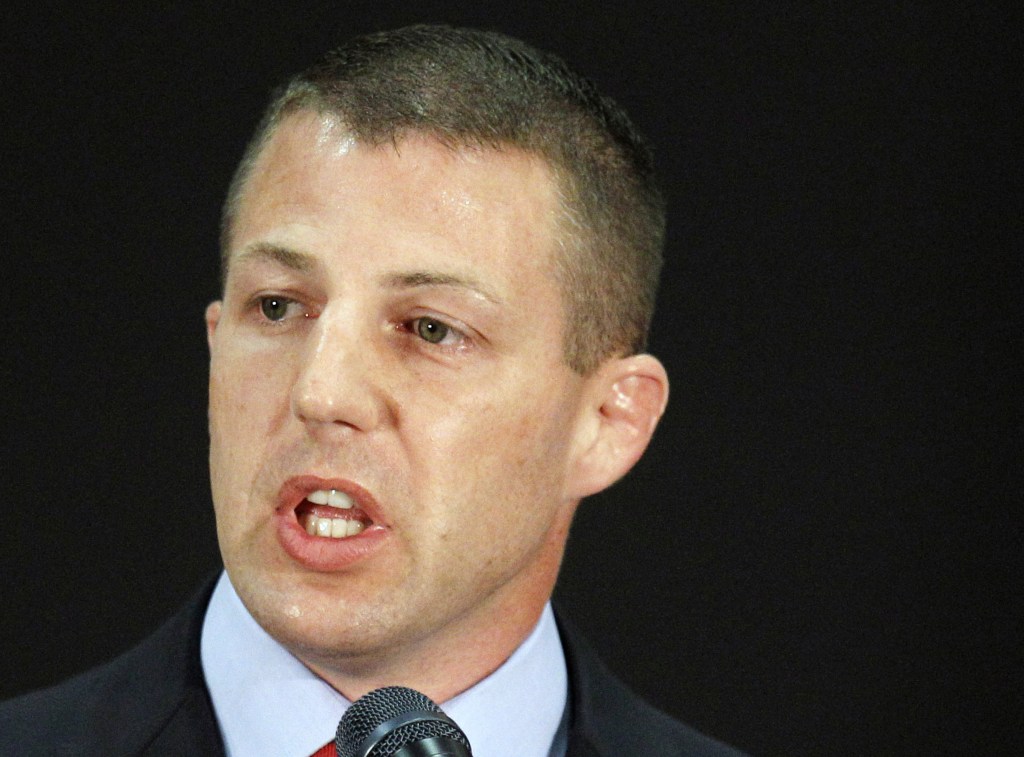WASHINGTON — Freshman Rep. Markwayne Mullin of Oklahoma is one of the hard-line House conservatives demanding concessions from President Barack Obama on his health care law in exchange for ending the federal government shutdown.
“We have got to get to the point where we’re working like a functional government, not like a dictatorship,” said Mullin, a 36-year-old rancher and plumbing business owner who insists that the president and Senate Democrats must negotiate on an emergency spending bill to re-open the government.
In Mullin’s expansive district, which stretches along eastern Oklahoma from Kansas to Texas, many constituents stand firmly behind the young Republican congressman even as they begin to feel the impact of the first government shutdown in 17 years. They’re unbending in their opposition to the three-year-old health care law and endorse any effort to unravel it.
“Wait it out,” Micah Thompson, a 32-year-old seminarian student and Army reservist from Canadian, Okla., advised Mullin. “It’s chicken. Someone’s got to blink first.”
For Thompson, the shutdown isn’t just a political fight in Washington. His brother, an employee at the McAlester Army Ammunition Plant, has been furloughed. This weekend, Thompson himself faces cancellation of his Army drills and the loss of pay.
Thompson knows what he doesn’t like about the health care law. “I think it’s wrong to make someone buy something they don’t want or don’t need,” he said, referring to the requirement that millions of Americans get coverage or face a penalty.
So Mullin stands firm, and he is not alone. Rebellious Republicans prevailed in pressuring Speaker John Boehner, R-Ohio, to link undoing the health care law to the temporary spending bill and have refused to relent, now four days into a government shutdown with no end in sight.
Few arguments have swayed these Republican newcomers, 71 from the tea party class of 2010 and 37 who arrived in Washington earlier this year. Many are too young to remember the last shutdown in 1995 and the political woes it created for the Republican Party.
The party’s last two presidential nominees — John McCain and Mitt Romney — have challenged the wisdom of the strategy but have been ignored. Republican senators have called the tactic dumb and a ploy but have failed to change minds. Nearly two dozen House Republicans have dissented, urging a vote on a straightforward bill to open the government, with little success.
Mullin’s fellow Oklahoman, six-term Republican Rep. Tom Cole, has also counseled against the stalemate, warning repeatedly that a shutdown and government default on paying its bills “are about the only two things that could jeopardize the House majority” next year. Cole is close to Boehner and serves as a deputy whip.
Says freshman Rep. Richard Hudson of North Carolina: “I’m more concerned about the impact of this law on the American people than I am about my re-election.”
In fact, Hudson and Mullin likely have little to worry about in the next election as neither has a viable Democratic challenger in Republican-trending Southern states.
In 2012, Hudson defeated conservative Democratic Rep. Larry Kissell, who managed to survive the tea party onslaught in 2010 but then lost in a district the legislature made more Republican by adding more GOP voters. Mullin won an open seat after conservative Dan Boren, one of the last remaining Southern Democrats and a constant top Republican target, decided not to run again.
By political degree of difficulty, Mullin’s district became 6 percentage points more Republican in 2012, while Hudson’s became 7 percentage points more Republican.
Mullin was just 20 when he took over the family plumbing business for his ailing father. It was a life lesson he employs today.
“If I would never figure out how to negotiate at the age of 20, I would have went broke, flat broke,” said Mullin, who often talks about buying his first suit when he came to Washington. “You have to know what you want and … what you’re willing to accept when you’re going to a negotiating table.”
Obama and Democrats have said they are willing to talk about changes to the health care law but not until House Republicans vote on a bill to open the government. Senate leaders have repeatedly said they won’t negotiate with a gun to their heads.
Mullin is a father of five, including 2-year-old twin girls he adopted earlier this year. The twins had been separated since they were three months old.
Mullin has said he will give back his salary during the shutdown.
Back in Crowder, Okla., Lonnie Anderson is cheering on Mullin in the high-stakes showdown with Obama and Democrats. The 71-year-old retired nurse likes some elements of the health care law, such as the requirement for insurers to cover individuals with pre-existing conditions, and allowing young people up to age 26 to remain on their parents’ plans.
But she fears that the law derided as “Obamacare” is a path to socialism and insists that if Obama can delay some requirements such as forcing big businesses to provide health coverage for their employees or face a penalty so can Congress.
“He’s been picking out the different parts of the law that he doesn’t like or going to hurt him right now and putting it off,” Anderson said. “Well, I don’t see anything wrong with us picking out things that aren’t right.”
Anderson speaks fondly of Mullin, recalling a time when she met him during a campaign event, told him of her upcoming surgery and asked for his prayers. She was surprised when he stopped, held hands and prayed with her.
Anderson said Mullin and the GOP “need to fight for everything they can.”
Send questions/comments to the editors.


